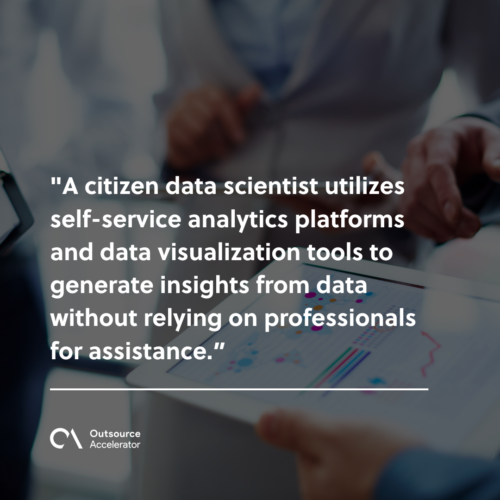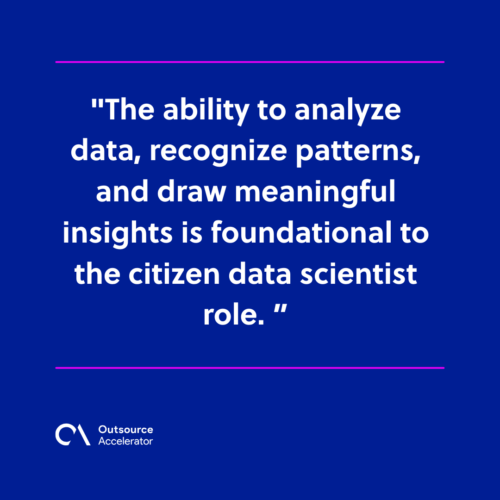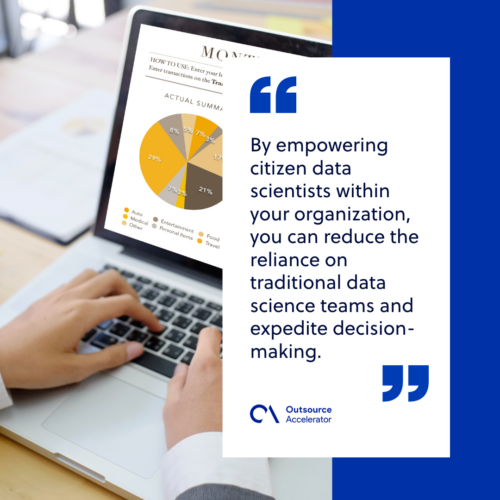Why you need to hire a citizen data scientist for your business

Businesses harness the power of data to gain insights, improve decision-making, enhance operational efficiency, understand customers, and stay competitive.
Traditionally, enterprises turn to the services of IT specialists and data scientists to manage their information. But recently, a new role, that of the citizen data scientist, has turned up.
These individuals are stepping into the forefront of data-driven innovation. Armed with a potent blend of domain knowledge and analytical skills, they bridge the gap between technical complexities and practical business insights.
As big data becomes more relevant, organizations may look more and more at the skills of a citizen data scientist.
This article delves into citizen data scientists, their unique skill sets, and the transformative impact they bring.
What is a citizen data scientist?
A citizen data scientist is a non-professional who engages in data analysis and interpretation for an organization.
This specialist utilizes self-service analytics platforms and data visualization tools to generate insights from data without relying on professionals for assistance.
Citizen data scientists come from diverse backgrounds and may be largely self-taught. This contrasts with traditional data scientists with advanced degrees and specialized statistics, mathematics, and computer science training.
The concept of a citizen data scientist has gained prominence in response to the growing need for companies to empower more employees to work with data.
Doing so will help accelerate innovation and decision-making in an increasingly data-centric economy.

Roles and responsibilities of a citizen data scientist
The roles and responsibilities of a citizen data scientist encompass a range of tasks that leverage both domain-specific knowledge and analytical skills.
While they can vary based on the organization and their specific domain expertise, generally, these responsibilities include:
Data exploration and analysis
Citizen data scientists explore and analyze data using self-service analytics tools. They also cleanse and preprocess data to ensure its accuracy and suitability for analysis.
Model development and implementation
A citizen data scientist uses analytical techniques like machine learning and statistical analysis to create predictive or prescriptive models. These models are applied to solve specific business problems or optimize processes.
Data visualization and communication
Citizen data scientists are expected to effectively communicate their findings through data visualizations, dashboards, and reports.
They should be able to present complex data insights clearly so that executives and stakeholders are well-informed.
Collaboration and teamwork
Citizen data scientists often collaborate with other teams and departments. They work together to gather data, define objectives, and develop solutions.
Together, they advocate for a collaborative data-driven culture within the company.
Continuous learning and improvement
As they are non-professionals, citizen data scientists must make extra effort to stay updated with the field of data science. They must keep up with news about the latest tools, techniques, and industry trends.
They should also continuously enhance their skills through self-study, online courses, workshops, and conferences. Skills to look for in a citizen data scientist
Identifying a proficient data scientist involves looking for a diverse skill set that blends technical acumen with domain expertise and excellent communication skills.
Here are some skills to consider when seeking a citizen data scientist for your organization:
- Data literacy – They need a solid foundation in data literacy, including understanding data concepts, data types, and data manipulation.
- Domain expertise – Data scientists should be knowledgeable about their domain and its context to data.
- Analytical thinking – The ability to analyze data, recognize patterns, and draw meaningful insights is foundational to the citizen data scientist role.
- Tool proficiency – They should be comfortable using self-service analytics tools, like Tableau or Microsoft Power BI, to manipulate data and generate insights.
- Problem-solving skills – Citizen data scientists should be skilled problem-solvers, capable of framing business challenges into data-centric problems and devising solutions.
- Communication – They should be able to work collaboratively with cross-functional teams.

When to hire a citizen data scientist
Here are some scenarios where recruiting a citizen data scientist can be especially useful:
- Skills gap – A citizen data scientist offers a solution to surging data volumes and rapidly changing data needs.
- Ad-hoc projects – Citizen data scientists are well-suited for working on ad-hoc projects where immediate insights are needed to drive decisions.
- Scalability – Training a citizen data scientist can be a scalable solution for increasing data analysis demands.
Why it is important to have a citizen data scientist
Having a citizen data scientist is crucial, as they contribute significantly to the effectiveness and agility of a business.
Here are the primary reasons highlighting the importance of a citizen data scientist:
Encouraging a data-literate culture
As employees engage in data analysis, there is a natural progression toward improved data literacy across the organization.
The presence of a citizen data scientist contributes to fostering a data-driven culture where data is seen as a valuable asset by all employees.
Domain-specific knowledge
A citizen data scientist often possesses deep domain knowledge related to their specific role or industry. This expertise allows them to ask more relevant questions, identify meaningful patterns, and apply data insights to solve problems innovatively.
Agile decision-making
By empowering citizen data scientists within your organization, you can reduce the reliance on traditional data science teams and expedite decision-making.
Quick data analysis by those closest to specific issues ensures quicker responses to evolving business scenarios.

Cost-efficiency
Hiring and retaining data science talent can be expensive. Training existing employees to become citizen data scientists is a more cost-effective approach, allowing you to maximize the value of your workforce.
Democratizing data access
Traditional data science expertise can be limited within specialized departments. A citizen data scientist broadens access to data analytics tools and insights, which allows more people to participate in the data process.
Determining when to raise a citizen data scientist from among your ranks depends on your unique needs and goals.
It’s essential to assess the current data landscape, organizational culture, and strategic objectives to make informed decisions about integrating them.







 Independent
Independent




